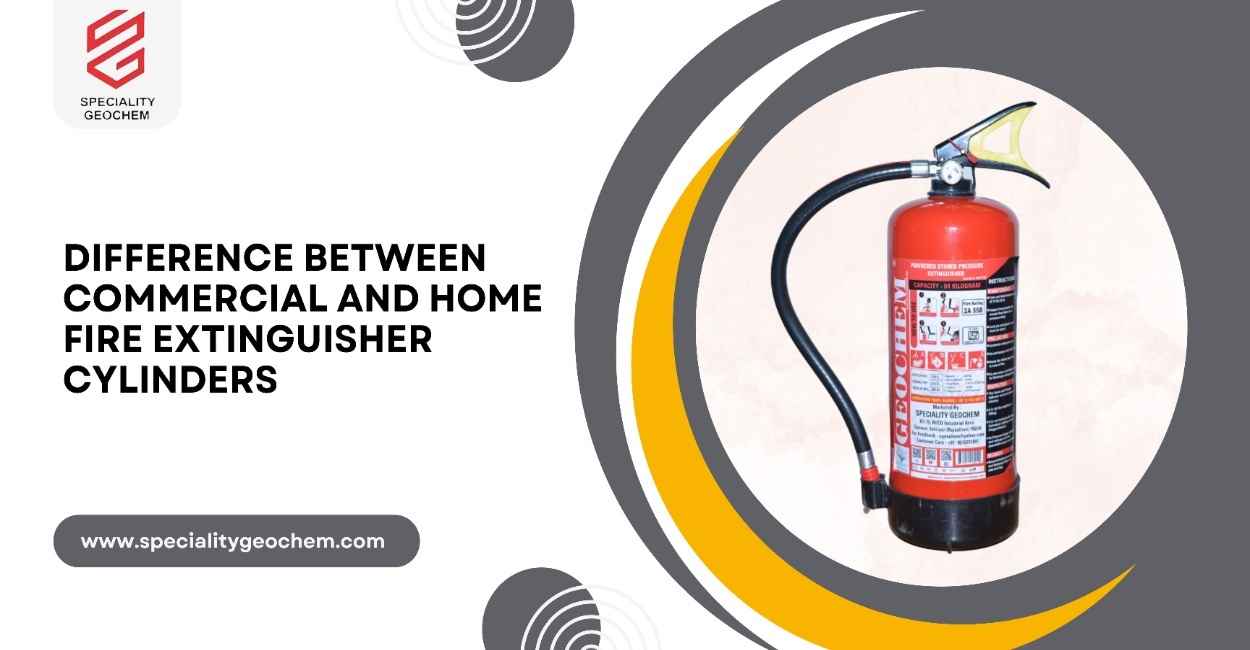Fire extinguishers are essential tools for fire safety—but not all extinguishers are built the same. The difference between commercial and home fire extinguisher cylinders lies in their size, design, type, coverage area, and intended usage. Whether you’re protecting your house or your workplace, choosing the right type of extinguisher is crucial for effective fire protection.
In this guide, we’ll break down everything you need to know about Home Fire Extinguisher Cylinders and how they compare to those used in commercial settings.
Understanding Fire Extinguisher Cylinders
Fire extinguisher cylinders are pressure vessels filled with fire-suppressing agents, designed to put out fires at the source. They are categorized based on:
- Fire class compatibility (Class A, B, C, D, K)
- Extinguishing agent (dry chemical, foam, CO2, water mist)
- Size and weight
- Discharge time and range
Home Fire Extinguisher Cylinders: Tailored for Domestic Safety
What Are Home Fire Extinguisher Cylinders?
Home fire extinguisher cylinders are compact, lightweight, and user-friendly fire extinguishers designed specifically for residential use. Their primary aim is to offer quick and effective response in case of small-scale fires in kitchens, garages, bedrooms, or living areas.
Key Features of Home Fire Extinguishers
- Size: Typically 1 kg to 4 kg (or liters), small enough for easy handling.
- Design: Simple, with clear instructions and color-coded nozzles.
- Operation: Often equipped with easy-to-use mechanisms like press-button discharge or squeeze handles.
- Target Fires: Most home extinguishers cover Classes A (wood/paper), B (liquids), and C (electrical equipment).
- Storage: Designed to be mounted on walls or placed in accessible locations without obstructing home aesthetics.
Commercial Fire Extinguisher Cylinders: Built for Bigger Risks
What Are Commercial Fire Extinguisher Cylinders?
Commercial fire extinguisher cylinders are larger, more robust, and capable of tackling high-risk fire hazards in offices, factories, warehouses, hotels, hospitals, and malls. These extinguishers are part of a larger fire safety system that may include smoke detectors, sprinklers, and fire alarms.
Key Features of Commercial Fire Extinguishers
- Size: Typically 6 kg, 9 kg, or more. Larger units offer extended discharge and coverage.
- Specialization: Available in multiple types like CO2, ABC powder, foam, and clean agents depending on the fire risk.
- Regulatory Compliance: Must meet industry standards and often require regular inspections under fire safety regulations.
- Durability: Built with heavy-duty metals, stainless steel, or corrosion-resistant coatings for industrial environments.
Home Fire Extinguisher Cylinders vs Commercial Ones
1. Size & Portability
Home Fire Extinguishers:
- Small and portable.
- Easily operable by teenagers, elderly, or untrained users.
- Ideal for quick access in confined spaces.
Commercial Fire Extinguishers:
- Larger and heavier, often requiring two hands.
- Mounted on wheels in some industrial applications.
- Requires trained personnel for efficient handling.
2. Types of Fire Risks
Home:
- Kitchen grease fires, electrical short circuits, mattress or paper fires.
- Often multi-purpose (ABC type) extinguishers are enough.
Commercial:
- Complex risks involving machinery, chemicals, cooking oils (Class K), or flammable gases.
- Requires a variety of extinguishers tailored to each zone.
3. Maintenance & Compliance
Home Fire Extinguishers:
- Low maintenance; some models are disposable after use.
- No formal compliance needed, but yearly self-check is recommended.
Commercial Fire Extinguishers:
- Mandatory periodic inspections and refilling.
- Legal compliance under Fire Safety Acts and insurance audits.
4. Cost and Investment
Home Units:
- Relatively affordable (₹1000–₹4000 depending on brand and type).
- One-time purchase with occasional replacement.
Commercial Units:
- Higher investment, especially for specialized types like foam or CO2.
- Includes recurring costs for inspection, maintenance, and refills.
5. Fire Suppression Capacity
Home Extinguishers:
- Designed for small-scale suppression (fire contained in one room).
- Discharge time is generally 8–12 seconds.
Commercial Extinguishers:
- Greater capacity and longer discharge time (15–30 seconds).
- Capable of covering larger areas or high-risk environments.
When Should You Choose a Home Fire Extinguisher?
A Home Fire Extinguisher Cylinder is perfect if:
- You want a lightweight, easy-to-use device.
- Your fire risks are limited to kitchen, electrical, or small combustible materials.
- You’re looking for low-cost safety options without complex maintenance.
When Is a Commercial Fire Extinguisher Necessary?
Opt for commercial fire extinguishers if:
- You’re managing a facility with heavy electrical equipment or flammable chemicals.
- Regulatory bodies require you to install approved extinguishers.
- A higher volume or specialized suppression system is needed.
Types of Extinguishers Commonly Used in Homes vs. Commercial Spaces
| Fire Extinguisher Type | Home Use | Commercial Use |
| ABC Dry Powder | ✅ | ✅ |
| CO2 | ⚠️ (only near electronics) | ✅ |
| Foam (AFFF) | ⚠️ | ✅ |
| Water Mist | ✅ | ✅ |
| Clean Agent | ✅ | ✅ |
| Class K (Wet Chemical) | ❌ | ✅ (for kitchens) |
Why Homeowners Shouldn’t Use Commercial Cylinders
Using large commercial extinguishers at home might seem safer, but it can be impractical:
- They’re too heavy for family members to operate during panic.
- They may contain agents that are harmful to electronics or furniture.
- They require space and maintenance, not feasible in small homes.
Instead, opt for automatic fire suppression balls, compact cylinders, or spray can-type extinguishers—available at Speciality Geochem, a trusted manufacturer of home fire safety solutions.
Conclusion
Choosing between commercial and Home Fire Extinguisher Cylinders isn’t just about size—it’s about using the right tool for the right environment. Home extinguishers offer simplicity, affordability, and targeted protection, while commercial extinguishers provide scale, durability, and regulatory assurance.
Fire doesn’t discriminate between homes and workplaces—but your safety gear should. Invest in the right type of extinguisher to protect lives, property, and peace of mind.
For reliable, certified, and affordable Home Fire Extinguisher Cylinders, trust Speciality Geochem, your partner in fire safety.

